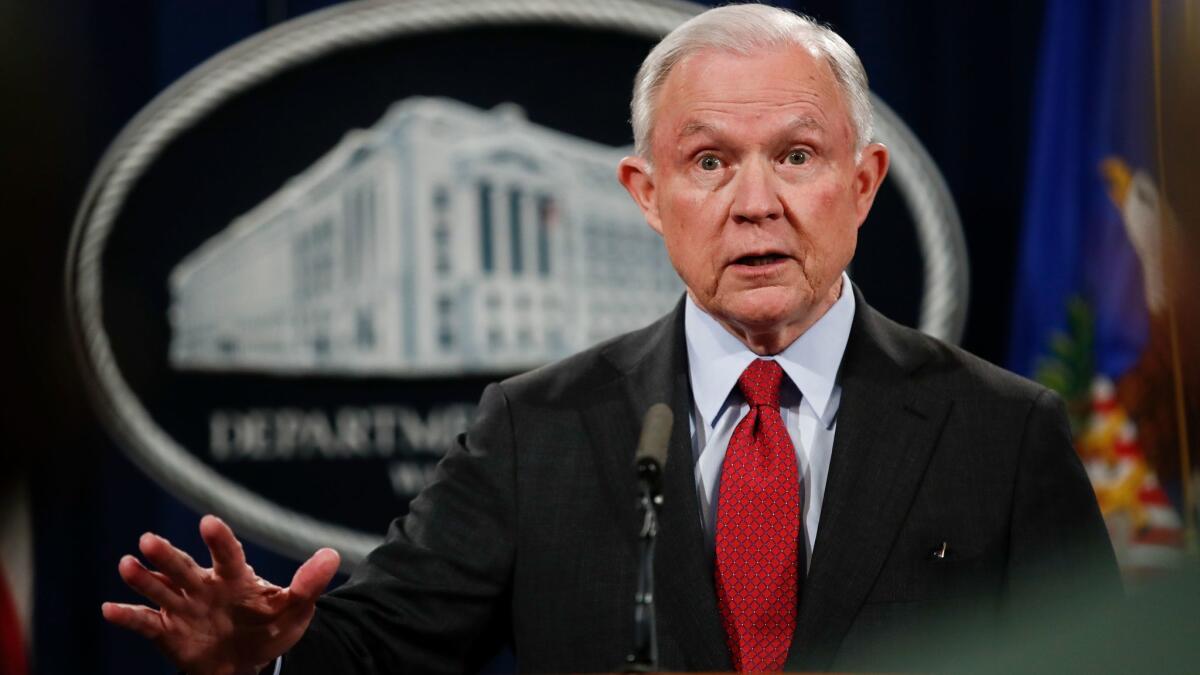Trump had lawyer urge Sessions not to recuse himself, source says

- Share via
Reporting from WASHINGTON — President Trump directed his White House counsel to tell Atty. Gen. Jeff Sessions to not recuse himself from the Justice Department’s investigation into potential ties between Russia and the Trump campaign, according to a person familiar with the matter.
The conversation between Don McGahn, the president’s White House counsel, and Sessions took place on the president’s orders and occurred just before the attorney general announced that he would step aside from the ongoing inquiry into Russian meddling in the 2016 presidential election, according to a person with knowledge of the interaction. Two other people confirmed details of the conversation between McGahn and Sessions.
All three people spoke on condition of anonymity to the Associated Press to avoid publicly discussing an ongoing investigation.
The episode is known to special counsel Robert S. Mueller III and his team of prosecutors and is likely of interest to them as they look into whether Trump’s actions as president, including the May firing of FBI Director James B. Comey, amount to improper efforts to obstruct the Russia investigation. Investigators recently concluded a round of interviews with current and former White House officials, including McGahn and former White House chief of staff Reince Priebus.
The New York Times first reported that Trump had McGahn lobby Sessions against a recusal.
Reached Thursday evening, Trump personal attorney John Dowd said, “I know nothing about that,” and hung up. Jay Sekulow, another of the president’s personal lawyers, did not immediately respond to a phone message seeking comment.
The White House also did not immediately respond to a request for comment.
Sessions announced on March 2 that he would recuse himself from the Russia probe. He said at the time that he should not oversee any investigation into a campaign for which he was an active and vocal supporter, though the recusal also followed the revelation that he had had two previously undisclosed interactions during the 2016 campaign with the Russian ambassador to the United States. At his Jan. 10 confirmation hearing, he had said he had no meetings with Russians.
But soon before the announcement, with White House officials anticipating that Sessions might be poised to step aside, McGahn spoke to Sessions by phone and urged him against recusing himself from the investigation.
During the conversation, according to people familiar with the matter, McGahn argued to Sessions that there was no reason or basis at that time for him to recuse. One person said McGahn also told him that recusal would do nothing to resolve concerns over whether Sessions had given a misleading answer at his confirmation hearing.
Sessions ultimately declined the urging, and McGahn ultimately accepted the conclusion of officials who believed that Sessions should recuse.
Sessions’ recusal left Deputy Atty. Gen. Rod Rosenstein in charge of the Russia investigation. But once Trump fired Comey two months later, Rosenstein appointed Mueller, a former FBI director, to run the investigation and to report to him.
Four people, including Trump’s former campaign chairman and national security advisor, have been charged so far in the investigation.
The Sessions recusal has been a sore spot for Trump for months, with the president publicly deriding the decision and lamenting his selection of the former Alabama senator as his attorney general.
In a July interview with the NewYork Times, Trump said, “Well, Sessions should have never recused himself, and if he was going to recuse himself, he should have told me before he took the job, and I would have picked somebody else.”
More to Read
Get the L.A. Times Politics newsletter
Deeply reported insights into legislation, politics and policy from Sacramento, Washington and beyond. In your inbox twice per week.
You may occasionally receive promotional content from the Los Angeles Times.










